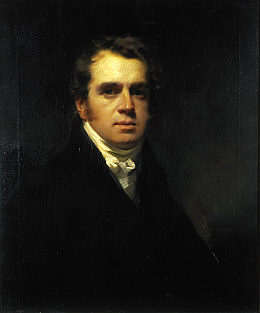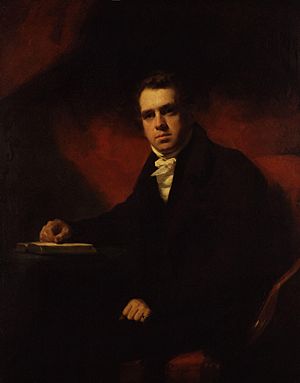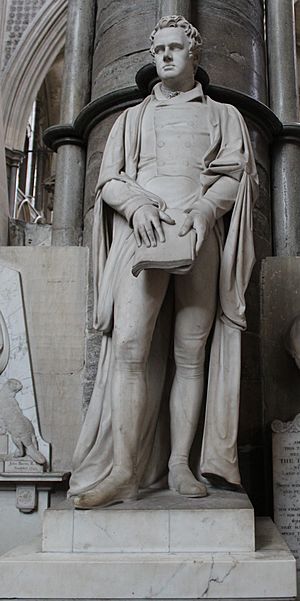Francis Horner facts for kids
Quick facts for kids
Francis Horner
|
|
|---|---|

Francis Horner by Henry Raeburn.
|
|
| Member of Parliament for St Mawes | |
| In office 1813–1817 |
|
| Member of Parliament for Wendover | |
| In office 1807–1812 |
|
| Member of Parliament for St Ives | |
| In office 1806–1807 |
|
| Personal details | |
| Born | 12 August 1778 Edinburgh, Scotland. |
| Died | 8 February 1817 (aged 38) Pisa, Italy. |
| Resting place | Old English Cemetery, Livorno, Italy. |
| Citizenship | United Kingdom of Great Britain and Ireland |
| Political party | Whig |
| Alma mater | University of Edinburgh |
| Occupation | Politician and lawyer. |
Francis Horner (born August 12, 1778 – died February 8, 1817) was an important Scottish figure. He was a Whig politician, a journalist, a lawyer, and an expert in how countries manage their money, called a political economist.
Contents
Early Life and Education: 1778–1807
Francis Horner was born in Edinburgh, Scotland. His father, John Horner, was a linen merchant. Francis had a younger brother, Leonard Horner, who also became well-known.
Francis went to the High School in Edinburgh. Later, he studied law at the University of Edinburgh. His teachers thought he was very smart and good at many subjects. After university, he spent some time near London, where he worked to lose his Scottish accent. He was also part of several student societies where he discussed ideas with other bright young people.
In 1800, he became a lawyer in Scotland. A few years later, he moved to London to train for the English legal system. He officially qualified as an English lawyer in 1807.
In 1802, Francis Horner helped start a famous magazine called the Edinburgh Review. He wrote many articles for it. Through this magazine, he met other Whig journalists who shared his political ideas. In 1807, he was chosen as a Fellow of the Royal Society of Edinburgh, which is a group for important scientists and thinkers.
Political Career and Ideas: 1806–1817
Francis Horner became a Member of Parliament (MP) in 1806. He represented different areas over the years: St. Ives (1806), Wendover (1807), and St. Mawes (1812).
He was very interested in political economy, which is the study of how governments should manage a country's wealth and resources. He believed in free trade and openly spoke against the Corn Laws. These laws made food expensive by putting taxes on imported grain. He also spoke out against slavery. In 1815, the City of London thanked him for his strong views against protectionism, which means protecting local businesses by taxing foreign goods.
In 1810, Horner led a special group called the Bullion Committee. This committee looked into why the price of gold was so high. He became very famous for his work on the Bullion Report. This report suggested that the government should allow banks to pay out gold again, rather than just paper money. He thought that having two main political parties sometimes stopped good ideas from being discussed properly.
Francis Horner also had strong opinions on international matters. In 1808, he supported Spain when it fought against Napoleon. He believed that Britain's war strategy should focus on helping European countries become independent again.
After Napoleon was defeated in 1814, Horner was critical of the peace agreements made at the Congress of Vienna. He called it "the plunder of Europe." When Napoleon returned to power, Horner was against starting another war and the high taxes it would bring. He also disagreed with bringing back the old royal families in France and Naples. These views sometimes caused disagreements with others in his own political group.
In 1816, a law he proposed for regulating grand juries in Ireland was passed. He also tried to stop the Bank Restrictions Act from being renewed. This act meant banks didn't have to pay out gold for their paper money. However, his ideas were not accepted by Parliament at that time.
Later Life and Legacy
In October 1816, Francis Horner became very ill. His doctors told him to go to Italy for his health. He moved to Pisa in December 1816 but sadly passed away there a few months later. He was buried in the Old English Cemetery in Livorno, Italy.
To honor his memory, a statue of Francis Horner was placed in Westminster Abbey in London. This famous church is where many important British figures are buried or remembered. Francis Horner never married and did not have any children.
Images for kids
-
Francis Horner by Sir Francis Chantrey, 1818
 | Madam C. J. Walker |
 | Janet Emerson Bashen |
 | Annie Turnbo Malone |
 | Maggie L. Walker |




